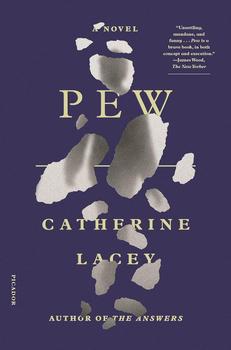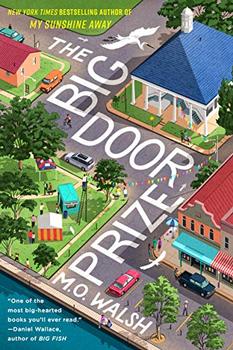Summary | Excerpt | Reviews | Beyond the book | Read-Alikes | Genres & Themes | Author Bio

A quote often attributed to Leo Tolstoy states that "All great literature is one of two stories; a man goes on a journey or a stranger comes to town." In her fourth work of fiction, a spare parable with a Southern Gothic ambiance, Catherine Lacey takes the latter story line to an extreme, using her protagonist as a symbol of everything that a community fears and dismisses as foreign.
Pew's narrator, who appears to be homeless, amnesiac and disinclined to speak, sleeps anywhere safe and enclosed: in the woods, behind a gas station or in a church. One Sunday morning, the narrator wakes up on a pew (see Beyond the Book) beside the Bonner family in the middle of a church service, observing everything like an alien anthropologist:
I was one of the things here: a hymnal, a Bible, an offering envelope, a tiny pencil. A person draped in heavy cloth stood at the front … and said things in such a way to make those words seem obvious and true.
Hilda and Steven Bonner invite their seatmate out to lunch and to stay at their home with their three boys.
The Reverend suggests the name "Pew" for the stranger, whose gender, race and age are unclear. He presses Pew for information, especially about their gender, saying, "you have to be one or the other … some people these days like to think a person gets to decide whether they are a boy or a girl, but we believe, our church believes and Jesus believed that God decides if you're a boy or a girl." Hilda arranges for a medical checkup at the hospital, insisting that it's out of concern for Pew's health—though it's also a way of determining their gender, getting a clue of their age and ensuring they've brought no contagion to the town. In any case, the attempt is futile; Pew refuses to change into a paper gown for the exam.
Over the five days leading up to Saturday's "Forgiveness Festival," Pew is passed between various community members who "babysit" them and attempt to elicit their story. These people give long monologues, filling up the silence by projecting their own views. Mrs. Gladstone, Hilda's stepmother, recounts her husband's horrific deathbed confessions about the violence he visited on local black people; Roger, a Quaker, leads art therapy projects; Sonny, the children's pastor, talks about suffering in the hope of drawing out Pew's trauma.
It's only to those who demand nothing—to Nelson, a refugee adopted by a local family; to Tammy, a careworn woman who keeps birds—that Pew says a few words. But when it comes to speaking up in their own defense to placate the Reverend and the Bonners, or to allay suspicions, Pew is unresponsive. Through every interrogation, they maintain their silence. Pew is perhaps less a well-rounded creation than a symbol of coming judgment (even hailed by an old woman as "our new jesus") or an embodiment of the community's fears. This character represents a threat to comfort, certainty and hegemony.
The drama over deciphering Pew's identity plays out against the preparations for the enigmatic festival and increasing unrest over disappearances in the area. On the Thursday before the festival, Pew is moved to "the black side of town" to stay with a different Reverend and his family—in hopes that the brown-skinned stranger may be more comfortable there and thus more willing to open up—and we hear the first hints that these missing-person cases may be racially motivated. Hilda and Steven have described the festival to Pew as a mass confession of sins, with blindfolds and curtains used to preserve people's anonymity. But it turns out there is a darker aspect to it that they have chosen not to explain.
Some readers may find this short novel's vagueness off-putting and its moral ambiguity disturbing. Lacey keeps Pew's background shadowy, though occasional freeze-frame imagery suggests imprisonment and abandonment. The author also stops short of apportioning either blame or approval. All of the characters are flawed and have their own agendas, but that feels true to life: no one is wholly good or makes all the right choices. I found the book troubling but strangely compelling at the same time; I raced through it in hope of answers. The fact that I didn't find many, or perhaps any (how ironic that Lacey's second novel is entitled The Answers!), left me unsettled, but meant that I won't forget Pew any time soon. I particularly recommend it to fans of Shirley Jackson and Flannery O'Connor.
![]() This review was originally published in The BookBrowse Review in August 2020, and has been updated for the
August 2021 edition.
Click here to go to this issue.
This review was originally published in The BookBrowse Review in August 2020, and has been updated for the
August 2021 edition.
Click here to go to this issue.

If you liked Pew, try these:

by M.O. Walsh
Published 2021
The New York Times bestselling author of My Sunshine Away returns with another instant Southern classic: a gripping and heartfelt novel about a mysterious machine that upends a small Louisiana town, asking us all to wonder if who we truly are is who we truly could be.

by Therese Anne Fowler
Published 2021
A gripping contemporary novel that examines the American dream through the lens of two families living side by side in an idyllic neighborhood, over the course of one summer that changes their lives irrevocably, from the New York Times bestselling author of Z and A Well-Behaved Woman.
These are not books, lumps of lifeless paper, but minds alive on the shelves
Click Here to find out who said this, as well as discovering other famous literary quotes!
Your guide toexceptional books
BookBrowse seeks out and recommends the best in contemporary fiction and nonfiction—books that not only engage and entertain but also deepen our understanding of ourselves and the world around us.